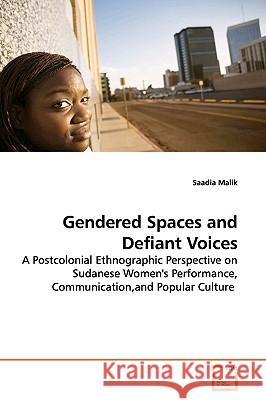Gendered Spaces and Defiant Voices » książka
Gendered Spaces and Defiant Voices
ISBN-13: 9783639176803 / Angielski / Miękka / 2009 / 112 str.
This book explores musical and personal experiences of three Sudanese women performers and analyzes textual meanings of a particular type of women's songs in Sudan called "aghani al-banaat." Because there are many discourses about "womanhood," culture, and gender in Sudan, aghani al-banaat could stand as another narrative for negotiating gender/power relations and identity formation by the Sudanese women. Despite being labeled as "loose" and "bad" singing, aghani al-baanat provided a discursive space through which the Sudanese women voiced their alternative narratives of social and gender relations. It offered both a framework of negotiating the existing relations as well as a dream of improvement.The book concludes that Sudanese women, especially the pioneering performers of ex-slave descendent origin, created their own culture and popular literature in which they contextualize the past, the present, and the future of their varied realities and fantasies.
This book explores musical and personal experiences of three Sudanese women performers and analyzes textual meanings of a particular type of womens songs in Sudan called "aghani al-banaat." Because there are many discourses about "womanhood", culture, and gender in Sudan, aghani al-banaat could stand as another narrative for negotiating gender/power relations and identity formation by the Sudanese women. Despite being labeled as "loose" and "bad" singing, aghani al-baanat provided a discursive space through which the Sudanese women voiced their alternative narratives of social and gender relations. It offered both a framework of negotiating the existing relations as well as a dream of improvement.The book concludes that Sudanese women, especially the pioneering performers of ex-slave descendent origin, created their own culture and popular literature in which they contextualize the past, the present, and the future of their varied realities and fantasies.











